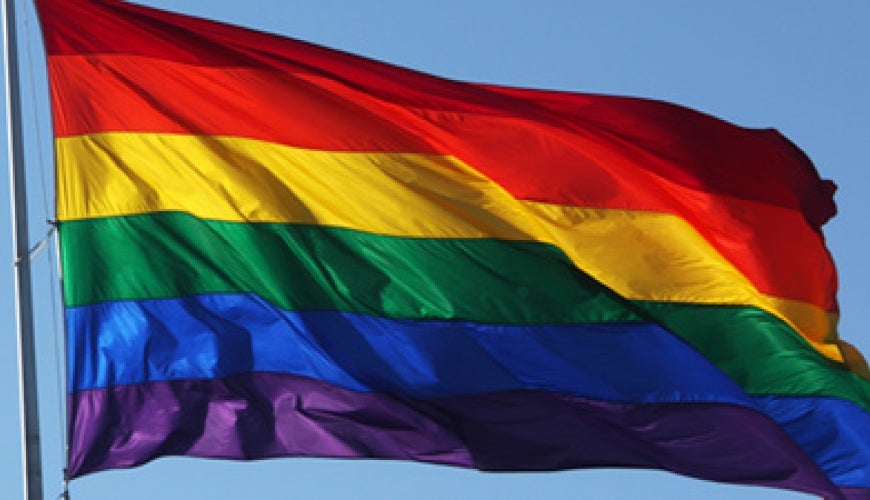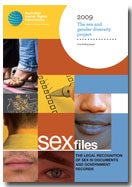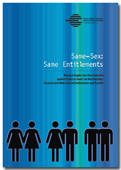Lesbian, Gay, Bisexual, Trans and Intersex Equality

Lesbian, Gay, Bisexual, Trans and Intersex Equality
Do you think you have been discriminated against in employment for reasons relating to your sexuality? See our Complaints page for information on how to make a complaint to the Australian Human Rights Commission.
You can also make a complaint if you think your human rights (including rights under the International Covenant on Civil and Political Rights) have been breached.
- Sexual orientation and human rights
- Sex and/or gender identity and human rights
- Intersex people and human rights
- Relevant human rights standards
- Commission’s current projects
- Commission’s past projects and publications
A comment on terminology
The Commission respects diversity of all kinds. We acknowledge the significance of terminology and that the use of inappropriate terminology can be disempowering. We also acknowledge that terminology is contested. The Commission understands that LGBTI people form a diverse group and sexuality or sex or gender identity is only one aspect of a person’s total identity.
The Commission understands that issues concerning sexual orientation are quite different to issues concerning sex and/or gender identity. However, the Commission is also mindful that some trans and intersex people feel strongly about the benefits of affiliation with the gay, lesbian and bisexual community. For this reason and because it is internationally recognised, the Commission uses the acronym ‘LGBTI’ which stands for Lesbian, Gay, Bisexual, Trans and Intersex. The T in LGBTI now stands for the more inclusive and less specific term ‘trans’ which has replaced ‘transgender’. On this page, the Commission addresses three distinct areas:
- Sexual orientation and human rights
- Sex and/or gender identity and human rights
- Intersex people and human rights
Sexual orientation and human rights
According to the Yogyakarta Principles, sexual orientation is understood to:
refer to each person’s capacity for profound emotional, affectional and sexual attraction to, and intimate and sexual relations with, individuals of a different gender or the same gender or more than one gender.
The Commission heard about some of the key issues facing the LGB community during its 2007 inquiry into discrimination against people in same-sex relationships. This report focused on financial and work-related entitlements and benefits particularly addressing the impact of discrimination in the areas of employment, workers’ compensation, tax, social security, veterans’ entitlements, health care, family law, superannuation, aged care and migration.
Click here for more information or to read the Same-Sex: Same Entitlements report.
There are a number of other significant issues facing the LGB community. These include:
- The lack of specific human rights protections, including protection from discrimination on the basis of sexual orientation in federal law.
- General homophobia and other adverse feeling towards lesbian, gay and bisexual people in the community can lead to discrimination and harassment.
- Equal rights of same-sex couples and protection from discriminatory laws.
- The rights of children raised in same-sex families. Protecting the best interests of a child is one of the most important principles of international law and the Convention on the Rights of the Child in particular. Children should not be discriminated against on the basis of their parents’ sexuality.
- Access to health services. The right to ‘the enjoyment of the highest attainable standard of physical and mental health’ is a fundamental human right recognised in Article 12 of the ICESCR. Members of the LGB community who face discrimination when accessing health services are denied their fundamental human rights. Discrimination on the basis of HIV status and the ability of HIV positive people to access and obtain adequate health care is also significant. For more information on health issues facing the LGB community, visit the National LGBT Health Alliance webpage.
- Access to aged care. Elderly LGB people also face difficulty accessing aged care and receiving equal treatment in the provision of aged care services.
Sex and/or gender identity and human rights
The term ‘sex and/or gender identity’ recognise that expression of gender identity is not necessarily linked to a person’s sex. Although the Commission recognises that there is a range of perspectives concerning preferred terminology, the use of these terms is intended to encompass all people with diverse sex and/or gender identities. During the Sex Files project the Commission used the term ‘sex and gender diversity’ to describe this broad group of people.
There are various legal, social, medical and scientific opinions and theories about what constitutes sex and what constitutes gender. Sex is most easily understood as whether a person is male or female. The Commission recognises that some people do not have a sex identity that is exclusively male or female. Gender is a cultural expression of sex identity (often but not always based on stereotypes of masculinity and femininity). Gender can be understood as a person looking, dressing or acting as male or female. Some people do not have a gender identity that is either exclusively male or female. Some people’s gender identity is not linked to their sex.
Despite a lack of consensus over the exact definition of sex or gender, sex and/or gender identity is an important part of a person’s identity. Sex and/or gender identity defines a person’s sense of self and positions them in a social and political context. Every person has the right to have their sex and/or gender identity recognised and respected.
Many terms have been used to describe people of diverse sex and/or gender identities. Some of these include agender, androgynous, cross dresser, drag king, drag queen, genderfluid, genderqueer, intergender, intersex, neutrois, pansexual, pan-gendered, third gender, third sex, transgender, transexed, transsexual, and without sex and gender identity. In addition, there are culturally specific terms, such as sistergirl and brotherboy, which are used by some Aboriginal and Torres Strait Islander people.
Sex Files is the concluding paper from the Commission’s sex and gender diversity project. The project specifically focused on issues concerning legal identity because it was the issue raised most frequently with the Commission. However there are a number of other significant issues facing people of diverse sex and/or gender identities. These include:
- appropriate protection from discrimination
- access to health services and treatment, in particular accessing and receiving hormone therapy, sex affirmation treatment and surgery
- greater public awareness of sex and gender diversity issues.
Click here for more information on the Commission’s sex and gender diversity project.
Intersex people and human rights
A person who is intersex is a person whose chromosomal, gonadal or anatomical sex is not exclusively ‘male’ or ‘female’.
There is no universal consensus on a broad term to describe all people who are intersex.
People who are intersex face many of the same issues around discrimination and recognition experienced by other LGBT people. However, there are a number of key issues specific to intersex people. These can be broadly categorised into the following areas:
- protection in law
- surgical intervention on intersex infants
- the lack of flexibility of medicine and medical protocols
- funding and representation for the community.
Relevant human rights standards
There is no separate human rights treaty focusing on sexuality and gender rights but LGBTI people have the right to enjoy all human rights available to other members of the community. In particular, people who are LGBTI enjoy the fundamental rights of non-discrimination and equality before the law. The United Nations Human Rights Committee has been very clear that the principle of non-discrimination and equality before the law protects LGBTI people under international law. These non-discrimination provisions are in the International Covenant on Civil and Political Rights (ICCPR), the International Covenant on Economic, Social and Cultural Rights (ICESCR), the Convention on the Rights of the Child (CRC), the International Convention on the Elimination of All Forms of Racial Discrimination (CERD) and the Convention on the Elimination of All Forms of Discrimination against Women (CEDAW).
For example, Article 2 of the ICCPR sets out the principle of non-discrimination:
Each State Party to the present Covenant undertakes to respect and ensure to all individuals within its territory and subject to its jurisdiction the rights recognised in the present Covenant, without distinction of any kind such as race, colour, sex, language, religion, political or other opinion, national or social origin, property, birth or other status.
Article 26 of the ICCPR sets out the principle of equality:
All persons are equal before the law and are entitled without any discrimination to the equal protection of the law. In this respect, the law shall prohibit any discrimination and guarantee to all persons equal and effective protection against discrimination on any ground such as race, colour, sex, language, religion, political or other opinion, national or social origin, property, birth or other status.
In March 2007, a group of human rights experts developed and adopted what is known as the Yogyakarta Principles. The Yogyakarta Principles confirm that all international human rights laws apply to LGBTI people. Click here for more information on the Yogyakarta Principles.
Commission's current projects
Commission's past projects and publications
- Sex and gender diversity project (2009)
- Same-Sex: Same Entitlements Inquiry (2007)
- Not Round Here: Affirming Diversity, Challenging Homophobia (2000)
- Superannuation entitlements of same sex couples: report of examination of Federal legislation (1999)
- Discrimination on the ground of sexual preference: Report of the Inquiry into Complaints of Discrimination in Employment and Occupation (1997)
Sex and gender diversity project
In May and June 2008, the Commission sought the views of the sex and gender diverse community about the most pressing human rights issues facing their community.
Commission documents from the sex and gender diversity project include: 
- a short issues paper analysing some sex and gender diversity issues and their human rights implications as part of this consultation.
- report of the initial consultation. Our report found that the most pressing human rights issue for people who are sex and gender diverse was the legal recognition of sex their official documents and in government records.
- online blog to continue discussions about the legal recognition of sex with the sex and gender diverse community.
- concluding paper. Sex Files, the concluding paper of the project, identified some problems with the existing system for recognising sex identity in documents and government records. It made recommendations for changing the system and provided options for implementing the changes.
Same-Sex: Same Entitlements Inquiry
The Commission’s report of the Same-Sex: Same Entitlements Inquiry was tabled in Parliament on 21 June 2007, following a year-long national inquiry. The Commission recommended that the Australian Government amend laws which discriminate against same-sex couples and their children in the area of financial and work-related entitlements and benefits.
At the end of 2008, the government amended 84 laws which discriminated against same-sex couples in a wide range of areas including taxation, social security, employment, Medicare, veteran’s affairs, superannuation, worker’s compensation and family law. The Commission welcomes these reforms. Some of these laws commenced immediately while others commenced on 1 July 2009.
Click here to access the full report and community guide. The Commission's paper, ‘Stories of discrimination experienced by the Gay, Lesbian, Bisexual, Transgender and Intersex community’, contains more information about common experiences of discrimination that LGBTI people face.
"Not Round Here: Affirming Diversity, Challenging Homophobia"
In 2000, the Commission and the Australian Youth Foundation developed a training manual called "Not Round Here: Affirming Diversity, Challenging Homophobia". The training manual is designed for use in anti-homophobia training for service providers whose clients and contacts include people who are gay, lesbian, bisexual or transgendered. It is particularly useful for rural service providers and includes training modules with a specific rural perspective.
Copies of the Manual are available in PDF format (2.05MB)
Superannuation entitlements of same-sex couples: Report of Examination of Federal Legislation
In 1999, the Commission examined federal legislation which established schemes to provide superannuation benefits to Commonwealth employees and members of the Australian Defence Force. In the event of the employee’s or member’s death, benefits are payable to a surviving spouse. However, the definition of ‘spouse’ in these enactments was held to be gender-specific, recognising only heterosexual relationships.
The Commission recommended that the relevant legislation be amended to remove provisions which impair equality of opportunity in employment and deny equal protection before the law. In particular, the report recommended replacing gender specific terms, such as ‘husband’, ‘wife’ and ‘spouse’ with gender neutral terminology so the benefits apply equally to opposite-sex and same-sex partners.
This discrimination was removed by the 2008 amendments to Commonwealth laws following the Same-Sex: Same Entitlements Report.
Click here to access the full report.
Discrimination on the grounds of sexual preference: Report of the Inquiry into Complaints of Discrimination in Employment and Occupation
In 1997, the Human Rights Commissioner inquired into a complaint of discrimination in employment on the grounds of sexual preference.
The Inquiry concerned the complaint made by Jacqui Griffin that the refusal of her application for classification as a teacher in Catholic schools by the Catholic Education Office was discriminatory. The Catholic Education Office said that Ms Griffith’s high profile in an organisation of gay and lesbian teachers and students and her public statements on sexuality meant that she was an unsuitable candidate.
The Human Rights Commissioner found that the refusal by the Catholic Education Office was discrimination on the ground of sexual preference.
The report of the Inquiry was published in March 1998. The report also noted that the current state of federal law in relation to discrimination based on sexual preference was inadequate to ensure protection of human rights. The Human Rights Commissioner recommended that federal anti-discrimination laws protecting against discrimination on the basis of sexual preference be implemented.
Click here to access the full report. PDF (78K), Word (84K)
